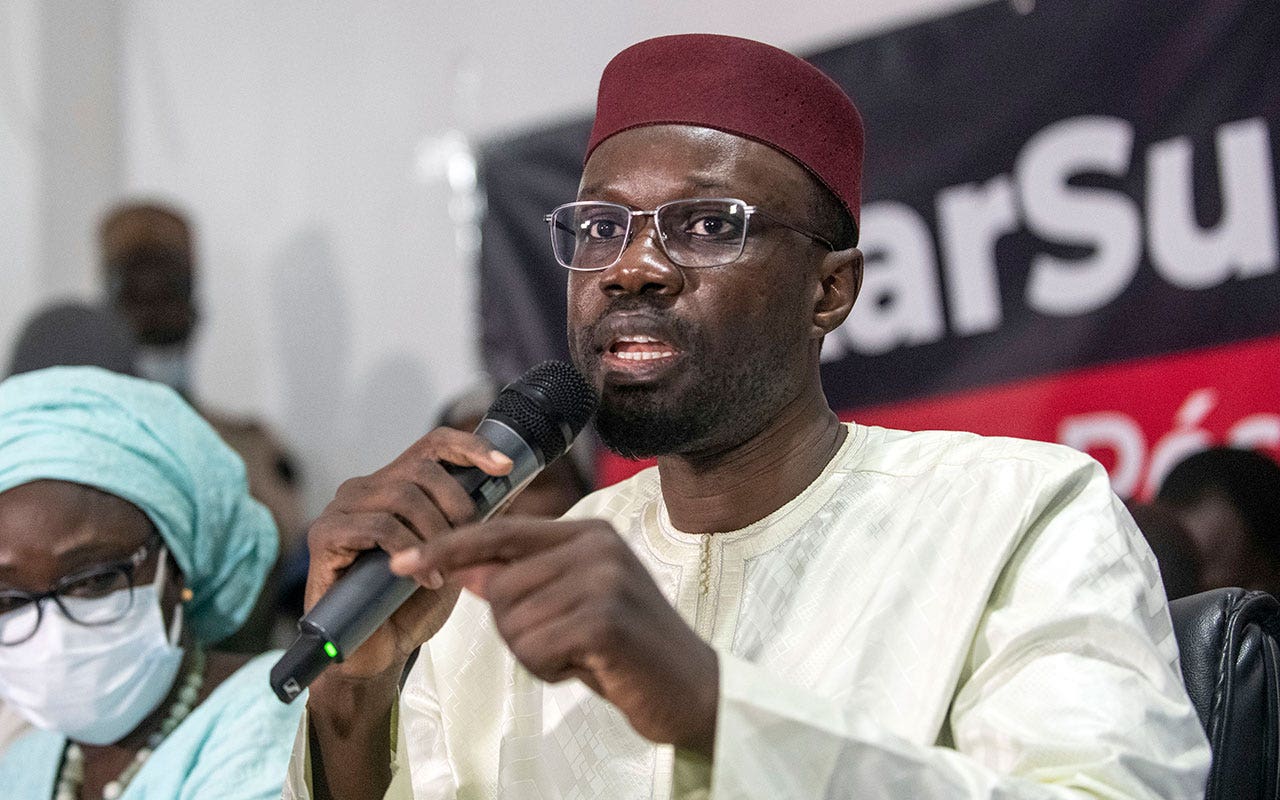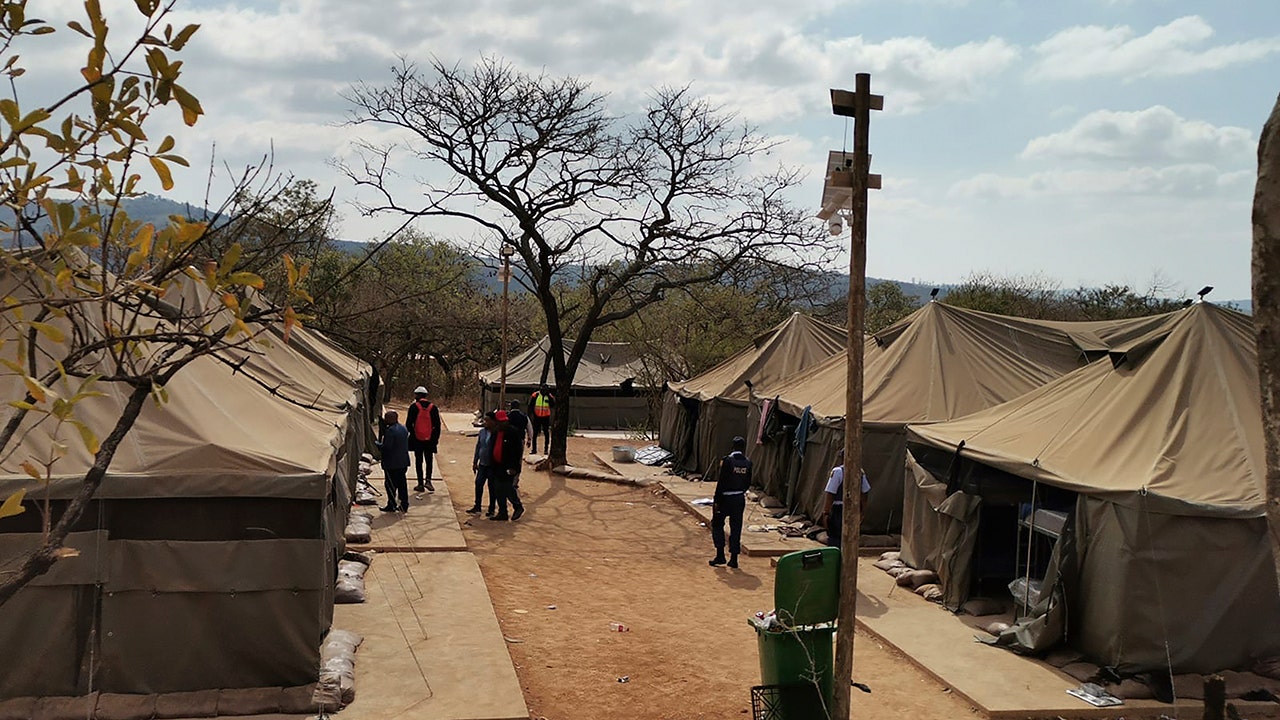World
Former Gambian interior minister sentenced for crimes against humanity by Swiss court

- Switzerland’s top criminal court convicted former Gambian Interior Minister Ousman Sonko of crimes against humanity.
- Sonko has been sentenced to 20 years in prison for his role in repression under ex-dictator Yahya Jammeh.
- Sonko, who served from 2006 to 2016, faced charges including homicide, torture and false imprisonment.
Switzerland’s top criminal court on Wednesday convicted a former interior minister of Gambia for crimes against humanity and sentenced him to 20 years over his role in repression committed by the west African country’s security forces under its longtime dictator, a legal advocacy group said.
Prosecutors had been seeking a life sentence for Ousman Sonko, Gambia’s interior minister from 2006 to 2016 under then-President Yahya Jammeh, TRIAL International said.
The Federal Criminal Court in the southern town of Bellinzona ruled that Sonko’s crimes — including homicide, torture and false imprisonment — amounted to crimes against humanity. However, they did not rise to “aggravated” cases that could have brought the maximum penalty of life behind bars, according to several lawyers who attended the trial.
SENEGAL’S OPPOSITION LEADER OUSMANE SONKO TO ADDRESS SUPPORTERS AFTER MONTHS IN PRISON
The trial, which began in January, was hailed by advocacy groups as a watershed application of the principle of “universal jurisdiction,” which allows for the prosecution of serious crimes committed abroad.
Legal advocacy group TRIAL International said on Wednesday that Ousman Sonko, pictured above, has been sentenced to 20 years in prison. (AP Photo/Sylvain Cherkaoui, File)
Activists and legal experts say the verdict could send a message to Jammeh, who fled Gambia and remains in exile in Equatorial Guinea.
Sonko, who was in the courtroom for Wednesday’s reading of the verdict, offered little reaction when a translation was read out in English, said TRIAL International’s legal adviser Benoit Meystre, who also attended the proceedings.
Sonko applied for asylum in Switzerland in November 2016 and was arrested two months later. The Swiss attorney general’s office said his indictment, filed a year ago, covered alleged crimes during 16 years under Jammeh, whose rule was marked by arbitrary detention, sexual abuse and extrajudicial killings.
TOP SENEGALESE OPPOSITION LEADER FREED FROM JAIL AS ELECTION NEARS
Sonko was accused of supporting, participating in and failing to stop attacks against opponents in Gambia, an English-speaking West African country surrounded by neighboring Senegal. The crimes included killings, torture, rape and numerous unlawful detentions, prosecutors said.
“This unprecedented conviction based on universal jurisdiction in Europe is the confirmation that no one is above the reach of justice,” Meystre said in a text message. “Even the most powerful figures can be brought to account for their participation in mass atrocities.”
Madi MK Ceesay, an award-winning journalist who was once arrested under Sonko’s orders and who testified in the trial, told The Associated Press the proceedings showed that “no matter what, the long arm of justice can always catch the perpetrator.”
Reed Brody, an American human rights lawyer who attended the trial, said Sonko’s conviction was a pivotal step toward justice for Jammeh’s victims.
“The long arm of the law is catching up with Yahya Jammeh’s accomplices all around the world, and hopefully will soon catch up with Jammeh himself,” he said.
Sonko was convicted of homicide, torture and false imprisonment as crimes against humanity, while rape charges against him were dropped, Brody wrote on X.
Outside the courtroom, Olimatou Sonko, the defendant’s daughter, told Swiss public broadcaster SRF “it isn’t fair” that the full proceedings of the trial weren’t translated to English from German, which her father doesn’t understand.
Philip Grant, executive director at TRIAL International, which filed the Swiss case against Ousman Sonko before his arrest, said he was the highest-level former official ever to be put on trial in Europe under the principle of universal jurisdiction.
Sonko, who joined the Gambian military in 1988, was appointed commander of the State Guard in 2003, a position in which he was responsible for Jammeh’s security, Swiss prosecutors said. He was made inspector general of the Gambian police in 2005.
He was removed as interior minister in September 2016, a few months before the end of Jammeh’s government, and left Gambia to seek asylum in Europe.
Ousman Sonko is not to be confused with leading politician Ousmane Sonko in Senegal, who spells his first name slightly differently.
Jammeh seized control in a 1994 coup. He lost Gambia’s 2016 presidential election but refused to concede defeat to Adama Barrow, and ultimately fled amid threats of a regional military intervention to force him from power.
“The verdict against Ousman Sonko is a milestone in the fight against impunity and a historic success for universal jurisdiction in Switzerland and Europe,” Amnesty Switzerland wrote on X. “Even former ministers can be prosecuted! Victims and their families finally see justice.”

World
Celine Dion Makes Triumphant Comeback at Paris Olympics Opening Ceremony — Watch Full Performance

ad
World
95 Libyan nationals arrested in South Africa at suspected secret military training camp

South African police arrested 95 Libyan nationals in a raid on a suspected secret military training camp on Friday and authorities said they were investigating whether there were more illegal bases in other parts of the country.
The camp was discovered at a farm in White River in the Mpumalanga province, about 360 kilometers (220 miles) northeast of Johannesburg, police said.
ELEPHANTS KILL TOURIST IN SOUTH AFRICA AFTER HE TRIED TO GET CLOSE TO TAKE PICTURES
National police spokesperson Athlenda Mathe said in a post on the social media site X that the Libyans stated they had entered the country on study visas to train as security guards, but police investigations suggest they have received military training.
The Newzroom Afrika TV news channel broadcast pictures of the site of the arrests, showing a military-style camp with large green and khaki tents set up in a row. Dozens of men were seen lining up as they were arrested. They were wearing civilian clothing.
Local government official Jackie Macie said investigations were ongoing and the owner of the farm would be questioned. He said authorities received information that there were similar secret camps near two other towns in Mpumalanga province.
A camp where 95 Libyan nationals were arrested on suspicion of running an illegal military camp are seen lining up after their arrest on Friday, July 26, 2024 in White River, South Africa. Police say that 95 Libyan nationals were arrested on suspicion of receiving training at a secret military camp in the north of the country. (AP Photo/Bulelwa Maphanga)
The province borders neighboring countries Mozambique and Swaziland and is an area of concern for South African authorities with regards to illegal immigration.
Police and authorities have not said whether the camps are suspected of being connected to a particular group or conflict.
Macie said investigations would establish if there was a network of camps in South Africa and show “why they are here doing military training in our country.”
Police said the men may be linked to crimes reported in communities close to the farm in recent months.
“We have serious cases which have been opened with the police, including cases of rape and armed robberies, which complainants claim were committed by unknown foreigners who seem to be of Asian descent,” said police spokesman Donald Mdhluli.
“We take what we have found here today very seriously because we don’t know who was training them, what were they being trained for and why that training is happening here in South Africa. It may be a threat not only to South Africa but also to the entire southern Africa region.”
Police said the operation to arrest the Libyans and close down the camp began two days ago. Macie said the Libyan nationals had been in the country since at least April.
“The 95 individuals taken into custody are all Libyan nationals and are currently being questioned by the relevant authorities,” Mpumalanga acting provincial police commissioner Maj. Gen. Zeph Mkhwanazi said in a statement.
Mdhluli, the police spokesman, said the country’s security regulator had confirmed that the kind of training that appears to have been taking place at the camp was well beyond the scope of training for security guards.
“The kind of equipment we found here shows that there was intense military training taking place here. This was basically a military base.”
World
Passengers face long, uncertain wait at stations amid rail disruption

A deliberate fire in a signal box about 60 km south of Lille caused the disruption on the northern high-speed line, with traffic halted around 5 a.m. local time on Friday.
Travel was severely disrupted in Lille on Friday, one of the stations affected by the sabotage that hit major French rail lines ahead of the Paris Olympics opening ceremony.
Many passengers waited with hope that soon turned to resignation.
“We’ve been waiting since 10:38 a.m. for the 11:38 a.m. train, and now we’re just waiting for it to arrive at 2:08 p.m.,” said Delphine, one of the stranded passengers.
“It’s still quite a delay, and we’ll be even later since we’re on a secondary route. I work in Avignon at 9 p.m., so it’s going to be very, very tight. We have a concert tonight — will it even happen? This is all very confusing, and we don’t understand what’s going on.”
For one traveller, this was a rough start to the holidays. “The worst case would be if the train is cancelled entirely and we have to buy new tickets for next week. It would shorten our already brief vacation. That would be a huge problem,” said Hippolyte.
When asked if he had been informed of the delays, Hippolyte said he received the notification just before departure.
“At around 10 a.m. this morning, we were told we were an hour late and would be leaving at 1 p.m.”
“It just keeps getting later as the day goes on. Every time we approach the new departure time, it gets pushed back another hour and a half, or half an hour each time.”
A deliberate fire in a signal box about 60 km south of Lille caused the disruption on the northern high-speed line. Traffic was halted around 5 a.m. on Friday.
The recent acts of sabotage on the rail network highlight that the Olympic Games are turning France into a prime target.
The attack disrupted the transport system on the opening day of the Games, causing delays of up to two hours or even cancellations that affected hundreds of thousands of passengers nationwide.
Authorities in Paris have said they are deploying substantial human resources to counter any threats and to ensure the safety of the events.
-

 World1 week ago
World1 week agoOne dead after car crashes into restaurant in Paris
-

 Midwest1 week ago
Midwest1 week agoMichigan rep posts video response to Stephen Colbert's joke about his RNC speech: 'Touché'
-

 News1 week ago
News1 week agoVideo: Young Republicans on Why Their Party Isn’t Reaching Gen Z (And What They Can Do About It)
-

 Movie Reviews1 week ago
Movie Reviews1 week agoMovie Review: A new generation drives into the storm in rousing ‘Twisters’
-

 News1 week ago
News1 week agoIn Milwaukee, Black Voters Struggle to Find a Home With Either Party
-

 Politics1 week ago
Politics1 week agoFox News Politics: The Call is Coming from Inside the House
-

 News1 week ago
News1 week agoVideo: J.D. Vance Accepts Vice-Presidential Nomination
-

 World1 week ago
World1 week agoTrump to take RNC stage for first speech since assassination attempt















